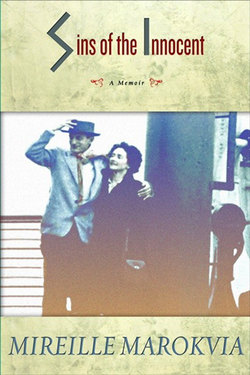Читать книгу Sins of the Innocent - Mireille Marokvia - Страница 10
На сайте Литреса книга снята с продажи.
V
Оглавление“But we are in Paris now, safe,” I said. “Nothing has changed in our own lives. Nothing.”
I taught as before but took only one course at the university. Abel worked for long hours on large, tragic canvases that people looked away from. One of these, a prison yard, I remember well. In the foreground, crouching on bare ground, a young man in a gray-blue tunic—a quasi-medieval figure—turned unseeing white eyes toward an invisible sky. In the background—memory, nightmare, or actual scene—three men squatting on straw under a dead tree mourned the naked cadaver stretched at their feet. Right behind, dangling from a makeshift gallows, two bare bodies—one did not seem quite lifeless. Beyond it all, a sunny high wall, and peeping over it a pink rooftop.
We made a brave attempt at resuming normal life. We met our friends in the cafés, went to parties, gave parties. We did not dare to say it aloud, but yes, we knew a blight had attacked the mood of our city that neither laughter nor wine could chase away. A sure sign of it was our policemen, posted at every street corner, becoming forever suspicious. Their dark glares followed us as we walked our beloved streets, sat at the terraces of our favored cafés and under the trees of our beautiful parks. As if the madness of the Spanish Civil War had spilled over our borders.
Memories of the Spanish Civil War, 1936 (oil)
One April afternoon, the historic Basque town of Guérnica, so close to our border, was reduced to rubble by German planes. Could this be true? Newspapers had often lied. Weeks later, eyewitnesses confirmed the bombing, but by then we had already pushed the news away as if it had been only a nightmare. By summer, when Picasso’s Guérnica appeared, we debated fiercely over the artistic merits of the painting. Only the painting.
One day a letter came from a friend of Abel’s who had, a few years before, emigrated to Argentina to join an uncle who owned a factory there.
“Europe is heading for trouble,” the friend wrote. “I urge you to follow in my footsteps.” And he had enclosed with his letter a one-way boat ticket for Buenos Aires.
We had been sunning ourselves on the terrace of our hotel when Abel opened the letter. We did not speak for a long time.
One ticket, I was thinking, only one ticket. I would have gone to Buenos Aires with Abel. I would have gone to the end of the world with him.
“Which language do they speak in Argentina?” Abel suddenly asked.
“Spanish.”
“I am not going to a Spanish-speaking country.”
He held up the ticket.
“We are going to drink it,” he said.
He sold the ticket. We invited friends. Our spirits were restored. “Let’s go to Greece,” I said.
At the beginning of August, with five other artists, we boarded old Andros in Marseille. We slept on deck, we lived on deck. The Mediterranean sky was sending down dozens of shooting stars that summer, and one night, sailing through the Straits of Messina, we saw Mount Etna sending back up big, fiery bunches of them.
In Athens, after our group dispersed, Abel and I decided to cross the Peloponnese on foot. For days we walked through a nearly treeless landscape, under a cloudless sky, at the pace our donkey dictated, led by a guide who spoke classical Greek and knew where the gods had concealed rare trickles of clear, cold water.
At the Dôme, Paris, ca. 1935
Night after night, we slept under a sumptuous, infinite sky. We dreamed of walking around the world together and came to believe we could. Eastward. We would go eastward, Marco Polo’s route.
Back in Athens, we made inquiries about visas at the Turkish consulate. A French passport and a German passport? Dark glares and shaking heads. We shrugged; ah, these ever-friendly Turks! Never mind, we needed more time anyway. We went on with our great voyage, sailing from one quiet, white island to another on shabby, romantic Greek vessels. We slept, sometimes on the sands of deserted beaches, close to blue waters as quiet as a lake’s, and sometimes under the broken marble columns and altars in the temples of long-abandoned gods. Travelers were sacred in ancient Greece. This did not seemed to have changed at all; we encountered only quiet courtesy everywhere. There were perhaps only half-a-dozen French painters visiting Greece in the summer of 1937. We did not meet any other foreigners.
During the trip back, the Andros—an ancient British passenger boat sailing under the Greek flag—got tossed badly in a sudden, violent squall that sent cooking pots and deck chairs flying overboard. We held on to the mast, scared, soaked, delighted like children by that moment of danger.
